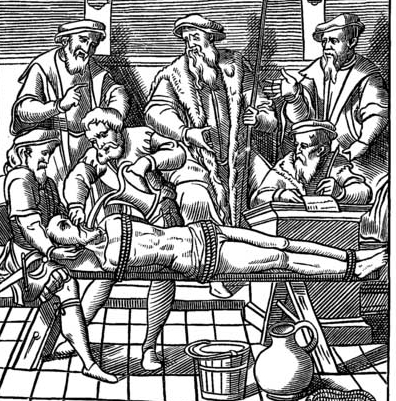The details coming out of Washington this day are horrifying:
A CIA-led interrogation program kept suspects in cold cells, doused them with refrigerated water and force-fed some rectally, according to graphic details revealed today in a report by Senate Democrats.
At least one detainee died in an unheated cell. Another tried to chew his arm and committed acts of self-mutilation. Others hallucinated, suffered from paranoia and exhibited other signs of psychosis.
The report issued today by Democrats on the Senate intelligence committee goes into gruesome detail about what supporters described as enhanced interrogation techniques. It concluded that the techniques used by the Central Intelligence Agency were largely ineffective at providing useful information and sometimes weren’t reviewed by the Justice Department.
Against this backdrop, it might be useful to remember that Catholic teaching on the subject is unambiguous:
Pope John Paul II, in his encyclical, “Veritatis Splendor,” included “physical and mental torture” in his long list of social evils which are not only shameful but also “ intrinsically evil.” In their 2007 document, “Forming Consciences for Faithful Citizenship,” the U.S. Conference of Catholic Bishops argued: “A prime example (of intrinsically evil actions) is the intentional taking of innocent human life, as in abortion and euthanasia. Direct threats to the sanctity and dignity of human life, such as human cloning and destructive research on human embryos are also intrinsically evil. Other direct assaults on innocent human life and violations of human dignity, such as genocide, torture, racism and the targeting of noncombatants in acts of terror war, can never be justified.”
“The Compendium of the Social Doctrine of the Church” asserts that the “prohibition against torture” is a principle that “cannot be contravened under any circumstances” (No. 404). It quotes Pope John Paul II as saying:” Christ’s disciple refuses every recourse to such methods, which nothing can justify.” Pope Benedict XVI, in a 2007 talk to Catholic prison ministers, directly quoted the “Compendium.” He asserted: “Means of punishment or correction that either undermine or debase the dignity of prisoners” must be avoided.
The U.S. bishops commissioned, in 2008, a pastorally helpful document, “Torture is a Moral Issue: A Catholic Study Guide,” which insists that human dignity can never — even in an enemy — be violated by torture. They warn against allowing the end to justify the means or resorting to desperate measures in desperate times. They urge us to listen to the voices of survivors of torture. They counsel against allowing euphemisms such as “enhanced interrogation methods” to paper over the resort to torture.
Finally, Stephen Colecchi discussed torture as a life issue a few years ago in the pages of America:
The basis for the church’s current total rejection of torture is its teaching on the life and dignity of the human person. The human person is created in the image of God. In Christ all are offered redemption without exception. In Catholic teaching, human dignity does not come from any human quality or accomplishment; it comes from God. For this reason, the catechism teaches, “It is also blasphemous to make use of God’s name to cover up criminal practices, to reduce peoples to servitude, to torture persons or put them to death” (No. 2148).
The catechism later declares: “Torture which uses physical or moral violence to extract confessions, punish the guilty, frighten opponents, or satisfy hatred is contrary to respect for the person and for human dignity” (No. 2298). The use of torture dishonors the Creator in whose image every human person is created and disfigures the human person who is worthy of respect.
In Catholic teaching, there is more than one victim of an act of torture. First there is, of course, a profound concern for the immediate victim of torture, whose body and mind suffer assault. But the church is also concerned for the human dignity of the perpetrator of torture, who is debased by the act itself. This is why the catechism, as it calls for the abolition of torture, also asks Catholics to “pray for the victims and their tormentors.”












